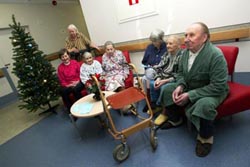Elderly care in Estonia
Demographically, Europe is experiencing constant changes, notably with regard to its elderly population. Unfortunately, there is a rapidly expanding ageing population and an all too often incoherent policy towards health and social care. The EC-funded project CARMA aimed to analyse the resources available and the needs of the elderly to provide the data for reorganisation of the health and social care systems. Project partners in Estonia, a country where over 15% of the population was 65 years old in 2003, have published their detailed study in the form of a book. Entitled, in English, 'Diminishing of risk of marginalisation in older people, pension systems, health and social care services in Estonia in 2003', it set about analysing the situation and making recommendations on the basis of the findings. The study revealed some important factors that are responsible for a situation where elderly care is inadequate and falls short of basic needs in some cases. These include an unnecessary division of resources within the system, a lack of geriatric medicine, a nursing health care system in its infancy, long waiting lists and high cost of drugs. To reform the system, the study recommended that interdisciplinary geriatric assessment, better networks, a common database together with improved cooperation be implemented. Recommendations do not only highlight the plight of the elderly themselves. The report also suggests that more support should be given to the families of elders who often supply a crucial source of care. Findings of all studies under the project umbrella have been pooled at conferences with the aim of exchange of information. Along with development of ideas by experts, they will no doubt contribute to the development of guidelines and protocols. Overall, they will be invaluable to policy makers and service providers in general and enhance the well being of Europe's elderly citizens.





